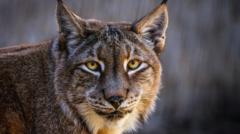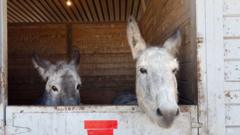Aalborg Zoo in Denmark has taken an unconventional step in animal husbandry, appealing to the public to donate healthy unwanted pets as a food source for its predators. The zoo has specifically requested live chickens, rabbits, and guinea pigs, emphasizing that these animals would be "gently euthanised" by trained staff. Interestingly, the zoo also welcomes live horses, with owners being able to claim a potential tax deduction for their donations.
In a social media post, Aalborg Zoo stated its commitment to mimicking the natural food chain of its resident carnivores, such as lions, tigers, and the Eurasian lynx. According to the zoo, smaller livestock forms a significant part of the diet for these predators, making this initiative beneficial for both the animals and potential donors.
The donation process allows for the delivery of small pets on weekdays, with no more than four animals permitted at once without prior scheduling. The zoo outlines conditions for horse donations, requiring a horse passport and evidence that the animal has not been treated for illness in the past month.
Pia Nielsen, the zoo's deputy director, explained that utilizing animals in this manner has been a longstanding practice at the facility. She remarked, “Keeping carnivores necessitates providing them with meat that closely resembles their natural diet, including fur and bones.” Nielsen noted the positive reception from the local community and partnerships, highlighting a shared appreciation for maximizing the utility of animals needing euthanasia for various reasons.
This initiative has sparked conversations on ethical zoo practices and feeding methods, marking a unique intersection of animal welfare, environmental responsibility, and community engagement.
In a social media post, Aalborg Zoo stated its commitment to mimicking the natural food chain of its resident carnivores, such as lions, tigers, and the Eurasian lynx. According to the zoo, smaller livestock forms a significant part of the diet for these predators, making this initiative beneficial for both the animals and potential donors.
The donation process allows for the delivery of small pets on weekdays, with no more than four animals permitted at once without prior scheduling. The zoo outlines conditions for horse donations, requiring a horse passport and evidence that the animal has not been treated for illness in the past month.
Pia Nielsen, the zoo's deputy director, explained that utilizing animals in this manner has been a longstanding practice at the facility. She remarked, “Keeping carnivores necessitates providing them with meat that closely resembles their natural diet, including fur and bones.” Nielsen noted the positive reception from the local community and partnerships, highlighting a shared appreciation for maximizing the utility of animals needing euthanasia for various reasons.
This initiative has sparked conversations on ethical zoo practices and feeding methods, marking a unique intersection of animal welfare, environmental responsibility, and community engagement.










